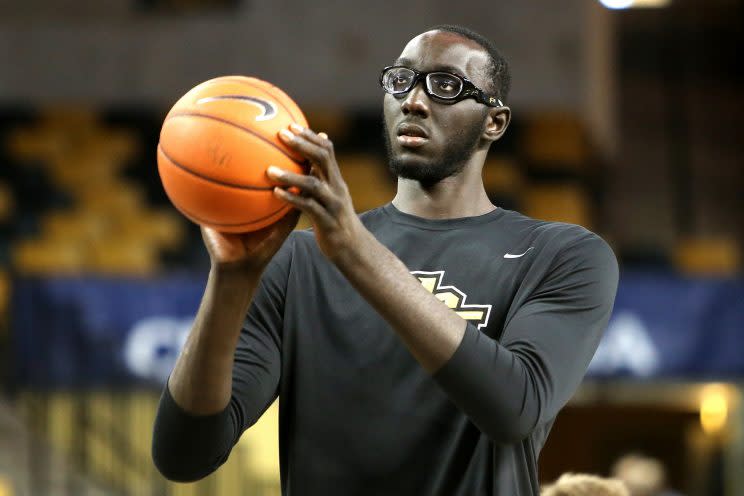UCF's Tacko Fall on President Trump's controversial travel ban: 'It affects all Muslims'

University of Central Florida’s Tacko Fall isn’t from a country on President Donald Trump’s travel ban list, but he is familiar with what it’s like to not know whether you are welcome in the United States. And as a devout Muslim, he feels impacted by the decision either way.
“I think it affects Muslims all around the world because it’s called a travel ban but it’s for [only] Muslim countries and that’s the reason why [those countries are banned],” Fall, who is originally from Senegal, told Yahoo Sports. “It affects all Muslims whether my country was part of the ban or not.”
When Trump signed an executive order on Friday night that banned Syrian refugees indefinitely and people from Iran, Iraq, Sudan, Libya, Yemen and Somalia from entering the United States for 120 days, Fall was asleep. But the 7-foot-6 center saw it all on social media the next morning.
He says he was surprised that it happened so quickly and felt like it “came out of the blue.”
Growing up in Dakar, Fall knows a little something about uprooting his life and moving to another country to pursue better opportunities. Even more than that, he knows what it feels like to worry whether or not he would be sent back.
At age 16 when Fall was attending Jamie’s House Charter in Houston, the school closed. He was left without a school to go to and without his I-20 form that he needed to study in the United States. After spending time with his dad who was a taxi driver in Cincinnati and trying schools in Georgia and Tennessee, but never staying one place too long due to paperwork, Fall ended up in Florida living with Mandy Wettstein, an acquaintance of a family friend.
After moving in with Wettstein and her family, Fall started school at Liberty Christian Prep even though he hadn’t yet gotten an I-20 certificate. He was walking on eggshells for months because if his appeal for an I-20 form was denied, he would have to go back to Senegal for 10 years.
“They were very afraid,” Wettstein said in a previous interview with Yahoo. “Ange [Fall’s friend who traveled to America with him] asked me every day, ‘Is there news? Have you heard anything?’ “
Fall’s appeal went through and he was able to stay in the United States. And that experience makes this ban even more personal for Fall.
After he found out on Saturday, he touched base with some of his basketball friends who are from Sudan and friends on campus from other countries affected by the executive order.
“Some of them are scared because some of them can’t get out of the country or they have family that can’t come back to the country,” Fall said. “And that’s kind of scary.”
Fall says he personally isn’t scared yet but he is worried about the far-reaching impact of the executive order.
“There are bad people everywhere but that doesn’t define Muslims,” Fall said. “A lot of Muslims are good people. Muslims are good people in general so it hurts me when I hear that Muslims have this stereotype. The crazy thing is, it might not be bad right now but the kids that are growing up listening to how [bad] Muslims are, those kids we should be worried about.”
One thing that gives Fall hope and peace of mind was seeing how many people came out to airports and participated in protests against the ban.
“That meant a lot,” Fall said. “A lot of those people were not Muslims but that’s how people should look at each other, through religion and races, we are all human. That’s how I see people and I wish that people would just look at each other like that.”

 Yahoo Sports
Yahoo Sports 

